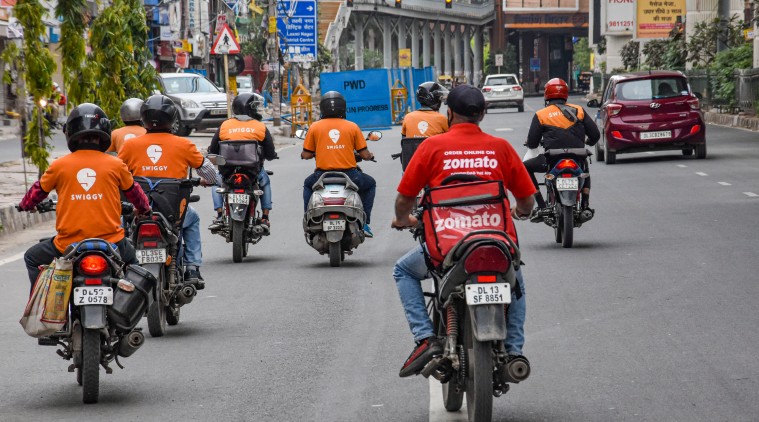 Zomato and Swiggy are food delivery aggregators allowed during the lockdown (File/ PTI)
Zomato and Swiggy are food delivery aggregators allowed during the lockdown (File/ PTI)
Earlier this week, a pizza delivery boy in South Delhi tested positive for COVOD-19. Consequently, people from 72 families wherein he delivered in the past few weeks, along with 17 of his colleagues, had to be quarantined. This created quite a tizzy among the common people, who were relying heavily on delivery of food and essentials, in the wake of the lockdown.
The said delivery partner was associated with Zomato, among the biggest delivery aggregators in the country. In a statement issued a day later, the company said, “At Zomato’s end, we are leaving no stone unturned to make sure that our customers, our delivery partners and our restaurant partners are safe.” It added, “COVID-19 could happen to anyone – and it is nearly impossible for all of us to completely isolate ourselves, especially when we need outside support for essentials such as food.”
The Delhi government also took up the matter strongly, announcing rapid tests of all personnel who are providing services during the lockdown. This includes delivery boys, ration, fruit, vegetable and chemists. Health Minister Satyendra Jain said that proper investigation will be conducted into the pizza delivery boy testing coronavirus positive case. “If it is found that the patient continued to work while being symptomatic, action will be taken against the employers,” said the statement.
Rahul Syal – Co-founder at DimCha, a cloud kitchen based in Vasant Kunj serving Chinese food, “The carrier could be either of them — a household where he delivered or the aggregator. Though all leading aggregators in the industry are taking necessary steps to ensure safety of their customers and their staff, it’s hard to tell who the carrier could have been.”
He adds that “even as it is incumbent upon customers to order online and pay online, delivery outlets should strictly follow all guidelines and take all necessary precautions to ensure a 100% safe delivery from their end.” However, he admits that not all aggregators are checking temperatures of delivery partners. “However, I am sure all good delivery kitchens are taking necessary measures to definitely ensure the safety of their staff,” he says.
However, Gaurav Mehta, Director of The Trial Box, which supplies gourmet boxes in and around Gurgaon, thinks otherwise. “This could have happened in any kind of delivery. It is unclear if anyone at the restaurant kitchen had COVID19 symptoms.”
“In most likelihood, the delivery chain wasn’t following contactless delivery. This should be mandatory at present times. Also payments should be routed via online modes rather than cash,” he says, adding, “If kitchens maintain totally contactless order tables with delivery boys and homes maintain contactless delivery, the issue will be limited to packaging material and food handling, which can be handled by following a set of rules for the same.”
Swiggy, another big food aggregator in the business, which has also started grocery deliveries lately, said in a blog, “We have been working hard to get masks to all our delivery partners through our network of cloud kitchens and restaurant partners. We have additionally also created a technology-based solution to check usage of masks by delivery partners before they start delivering every day.”
Swiggy claims it also regularly sends reminders to delivery partners on best practices of respiratory hygiene, proper method and frequency of hand washing, as well as identification of associated symptoms. For restaurants and kitchens, there is a set of guidelines to follow, which include, “hand-washing regimes, mandatory temperature checks, use of 3-ply face masks for all staff, self quarantine measures in case of any illness, and sanitisation facilities for delivery partners at the order pick-up points.”